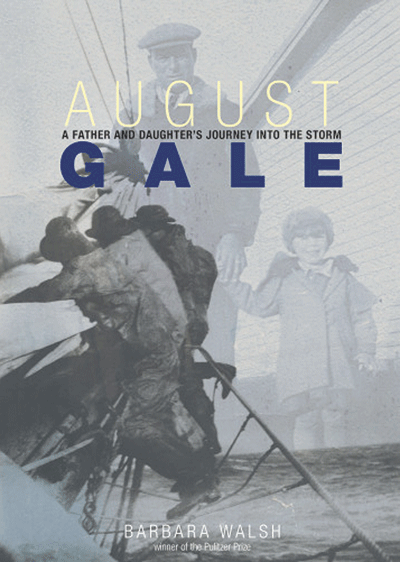By LLOYD FERRISS
“August Gale: A Father and Daughter’s Journey Into the Storm” by Barbara Walsh reads like a suspense-filled work of fiction. Instead, it’s a gripping family saga in which Walsh connects the dots between a long-ago storm at sea and her grandfather’s abandonment of her father.
Walsh is a Pulitzer Prize-winning journalist who lives in Winthrop. Her new, thoroughly researched book of personal nonfiction is so intriguingly readable that it’s likely to be a chart-topper in this state and elsewhere.
“August Gale” begins with an incident that, like others in this book, seems to border on the supernatural.
Ambrose Walsh, 27, is taking his lunch break on a park bench facing the Brooklyn, N.Y., waterfront. It’s late summer 1935, nine years after Walsh emigrated from a coastal town in Newfoundland where almost everyone – among them his beloved older brother, Paddy – fishes for cod in the icy offshore waters.
Now, as Ambrose idly watches waves lapping at a pier, he’s distracted. “A strange and sudden gust, a warm August breeze, pulls Ambrose from his thoughts,” Walsh writes. “Sheets of newspaper drift in the air and tumble along the pier until they reach the bench where the young man sits.”
He bends and picks up the tattered paper, its front-page story suddenly in front of him: “AUGUST GALE KILLS MORE THAN 40 NEWFOUNDLAND FISHERMEN.”
Instead of returning to work, Ambrose takes the Staten Island Ferry to the borough by that name, where he stumbles to his apartment.
“When he arrives at his doorstep,” Walsh writes, “his voice hysterical with grief, his wife, Patricia, hushes their baby, as Ambrose, himself, weeps like a child.”
In the same chapter, Walsh explains: “My father, Ronald Eugene Walsh, was the baby Ambrose’s wife hushed that August afternoon in 1935, the dark-haired son whom Ambrose would abandon eleven years later.”
For the next 267 pages, Walsh’s saga explores the two events bound inextricably together: the August storm that killed many of her ancestors, and the hard-to-explain other tragedy. Namely, why did Ambrose – raised as a Catholic in a strongly bonded Newfoundland family – desert his own family not once but twice, leaving Patricia Walsh and two sons to fend for themselves in New York City 65 years ago?
The author of “August Gale” grew up one of six sisters (there were two sets of twins) in Pelham, N.H. Her dad, despite childhood poverty, was a happily married and successful provider. In 1981, Walsh graduated as a journalism major from the University of New Hampshire and went on to enjoy early success.
At the Eagle Tribune in Lawrence, Mass., she was one of two reporters to share a Pulitzer Prize for a yearlong series about convicted killer Willie Horton and the flawed Massachusetts prisoner system. Walsh went on to write – and win awards – for the Sun-Sentinel in Fort Lauderdale, Fla.
In 1996, she became a staff writer for The Portland Press Herald/Maine Sunday Telegram. Her 1999 series “A Stolen Soul” chronicled a mother’s attempt to get her son’s murderer behind bars. It won a national Dart Award for excellence in reporting on victims of violence.
Three years ago, Walsh, 53, left full-time journalism to write or finish books she’d been working on for a number of years. First to be published was “Sammy in the Sky,” a children’s book illustrated by artist Jamie Wyeth. “August Gale” made its debut earlier this month.
Walsh writes at her home on Maranacook Lake, where she lives with her husband, Eric Conrad, and their two daughters.
In researching her book, Walsh made three trips to Marystown, Newfoundland, where her Irish ancestors settled many years before the 1935 storm. There, relatives greeted her warmly.
“It was like I knew ye all my life,” she quotes a man named Brenton as saying. “Ye felt like family pretty fast.”
The monster storm comes alive in “August Gale” through graphic survivor accounts.
“ ‘Tis like the devil rose up from the sea,” Walsh quotes one survivor as saying. “The water, she boiled up, and crashed upon us like mountains. The wind she was blowing wicked to the world…”
“August Gale” is a powerful account of a tragedy at sea and of a family’s heartwarming quest to heal. It is an unforgettable book.
Lloyd Ferriss is a writer and photographer who lives in Richmond.
Send questions/comments to the editors.



Comments are no longer available on this story